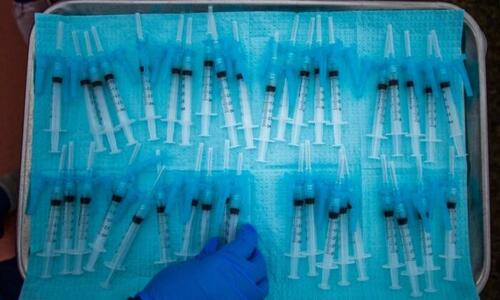
Authored by Zachary Stieber via The Epoch Times (emphasis ours),
The U.S. National Institutes of Health (NIH) is refusing to release additional information about an agreement it reached over a COVID-19 vaccine that has earned it at least $400 million.

The NIH declined to provide any materials in response to a Freedom of Information Act request from The Epoch Times.
“The NIH withholds the entirety of the records as they are protected from release,” Gorka Garcia-Malene, an NIH officer, told The Epoch Times in a letter.
She cited an exemption outlined in the act that allows government agencies to partially or fully withhold information.
“In this case, exemption 3 incorporates 35 U.S.C. 209 (f), which reads in relevant part, ‘No Federal agency shall grant any license under a patent or patent application on a federally owned invention unless the person requesting the license has supplied the agency with a plan for development or marketing of the invention, except that any such plan shall be treated by the Federal agency as commercial and financial information obtained from a person and privileged and confidential and not subject to disclosure under section 552 of title 5,’” Ms. Garcia-Malene wrote.
“Exemption 4 protects from disclosure trade secrets and commercial or financial information that is privileged and confidential,” she added.
In February 2023, Moderna announced that it had paid $400 million to the NIH and would make additional payments in the future as part of a licensing agreement for spike proteins used in the company’s COVID-19 vaccine. The Epoch Times obtained a copy of the contract, which confirmed the payment but redacted details of the future payments.
The Epoch Times then lodged a new request, seeking more details about the future payments, which are said to be based on how many COVID-19 vaccines are sold.
Ms. Garcia-Malene was responding to the new request.
James Love, director of the nonprofit Knowledge Ecology International, said the information should be made public.
“The NIH put out several press statements about the royalty dispute with Moderna, and they should not now claim it is some secret confidential information. And when hundreds of millions of dollars are at stake, the public interest in transparency is large too,” Mr. Love told The Epoch Times in an email.
“There are a lot of NIH officials who resent transparency,” he added.
Inquiries to NIH spokespersons received away messages. Another request for comment, sent to one of the addresses provided in the away messages, was not returned.
The Epoch Times plans to appeal the NIH’s decision.
The NIH is one of several government agencies that receive royalty payments. Officials there have fought against attempts to acquire information on these payments, but in 2023, they disclosed some $325 million in royalties received between 2009 and 2020 after being sued.
Some experts say the payments, made to the agency and many of its top scientists, should be stopped.
“Neither the government nor any government employee should have any financial interest in a product for which the government has any involvement in licensing or promoting,“ Aaron Siri, managing partner of Siri & Glimstad LLP, told The Epoch Times in an email. ”It creates a dangerous conflict of interest.”
Move on BioNTech
The NIH is trying to obtain more money from COVID-19 vaccine manufacturers, according to recent filings.
BioNTech, Pfizer’s partner, said in the forms that the NIH served it with a notice of default because the NIH’s position is that BioNTech owes it money from COVID-19 vaccine sales.
BioNTech said it does not think it owes the NIH money but that “the ultimate outcome of these matters is uncertain and we cannot guarantee that our interpretation of these license agreements will prevail, or that we will not ultimately need to pay some or all of the royalty and other related amounts in dispute.”
The NIH did not return inquiries on the BioNTech filings.
The NIH has said previously it licensed its spike protein technology to BioNTech for the Pfizer-BioNTech COVID-19 vaccine.
The Epoch Times has submitted a Freedom of Information Act request for the notice of default and related documents. Another request seeks information on whether the NIH has threatened or served Pfizer with a similar notice.
However much money the U.S. government receives in royalties will be much less than it has paid for the vaccines. The government has purchased hundreds of millions of shots, spending north of $30 billion.
Authored by Zachary Stieber via The Epoch Times (emphasis ours),
The U.S. National Institutes of Health (NIH) is refusing to release additional information about an agreement it reached over a COVID-19 vaccine that has earned it at least $400 million.

The NIH declined to provide any materials in response to a Freedom of Information Act request from The Epoch Times.
“The NIH withholds the entirety of the records as they are protected from release,” Gorka Garcia-Malene, an NIH officer, told The Epoch Times in a letter.
She cited an exemption outlined in the act that allows government agencies to partially or fully withhold information.
“In this case, exemption 3 incorporates 35 U.S.C. 209 (f), which reads in relevant part, ‘No Federal agency shall grant any license under a patent or patent application on a federally owned invention unless the person requesting the license has supplied the agency with a plan for development or marketing of the invention, except that any such plan shall be treated by the Federal agency as commercial and financial information obtained from a person and privileged and confidential and not subject to disclosure under section 552 of title 5,’” Ms. Garcia-Malene wrote.
“Exemption 4 protects from disclosure trade secrets and commercial or financial information that is privileged and confidential,” she added.
In February 2023, Moderna announced that it had paid $400 million to the NIH and would make additional payments in the future as part of a licensing agreement for spike proteins used in the company’s COVID-19 vaccine. The Epoch Times obtained a copy of the contract, which confirmed the payment but redacted details of the future payments.
The Epoch Times then lodged a new request, seeking more details about the future payments, which are said to be based on how many COVID-19 vaccines are sold.
Ms. Garcia-Malene was responding to the new request.
James Love, director of the nonprofit Knowledge Ecology International, said the information should be made public.
“The NIH put out several press statements about the royalty dispute with Moderna, and they should not now claim it is some secret confidential information. And when hundreds of millions of dollars are at stake, the public interest in transparency is large too,” Mr. Love told The Epoch Times in an email.
“There are a lot of NIH officials who resent transparency,” he added.
Inquiries to NIH spokespersons received away messages. Another request for comment, sent to one of the addresses provided in the away messages, was not returned.
The Epoch Times plans to appeal the NIH’s decision.
The NIH is one of several government agencies that receive royalty payments. Officials there have fought against attempts to acquire information on these payments, but in 2023, they disclosed some $325 million in royalties received between 2009 and 2020 after being sued.
Some experts say the payments, made to the agency and many of its top scientists, should be stopped.
“Neither the government nor any government employee should have any financial interest in a product for which the government has any involvement in licensing or promoting,“ Aaron Siri, managing partner of Siri & Glimstad LLP, told The Epoch Times in an email. ”It creates a dangerous conflict of interest.”
Move on BioNTech
The NIH is trying to obtain more money from COVID-19 vaccine manufacturers, according to recent filings.
BioNTech, Pfizer’s partner, said in the forms that the NIH served it with a notice of default because the NIH’s position is that BioNTech owes it money from COVID-19 vaccine sales.
BioNTech said it does not think it owes the NIH money but that “the ultimate outcome of these matters is uncertain and we cannot guarantee that our interpretation of these license agreements will prevail, or that we will not ultimately need to pay some or all of the royalty and other related amounts in dispute.”
The NIH did not return inquiries on the BioNTech filings.
The NIH has said previously it licensed its spike protein technology to BioNTech for the Pfizer-BioNTech COVID-19 vaccine.
The Epoch Times has submitted a Freedom of Information Act request for the notice of default and related documents. Another request seeks information on whether the NIH has threatened or served Pfizer with a similar notice.
However much money the U.S. government receives in royalties will be much less than it has paid for the vaccines. The government has purchased hundreds of millions of shots, spending north of $30 billion.
Loading…






